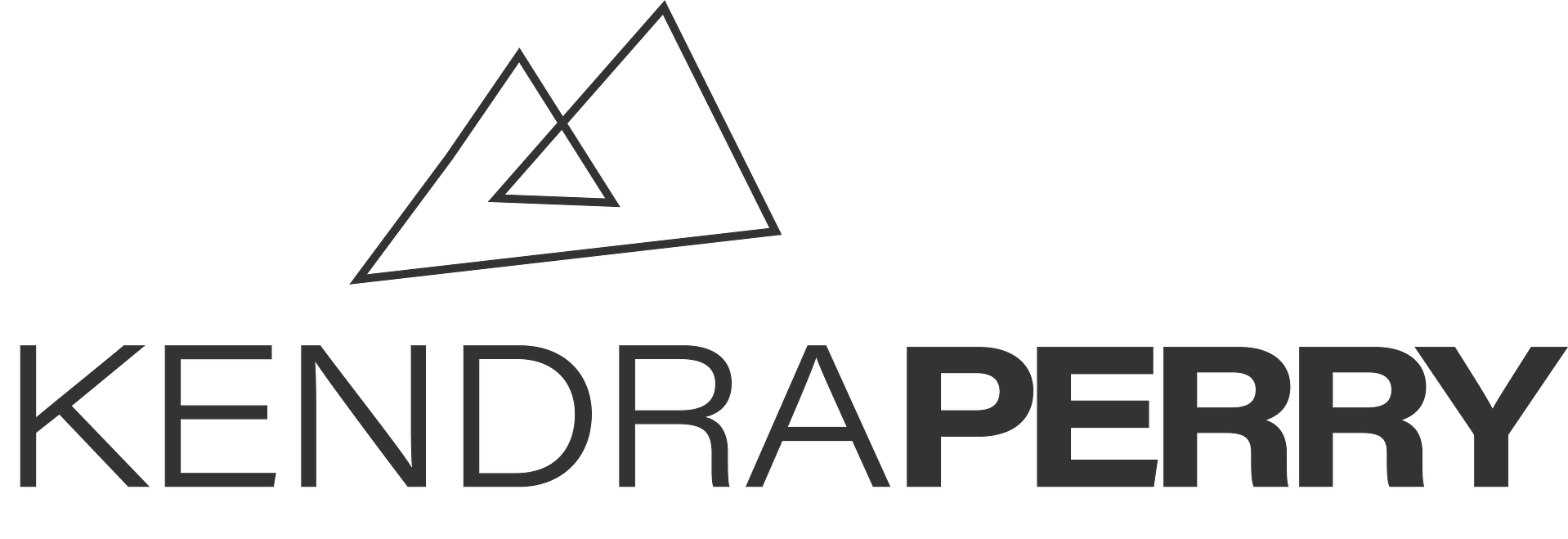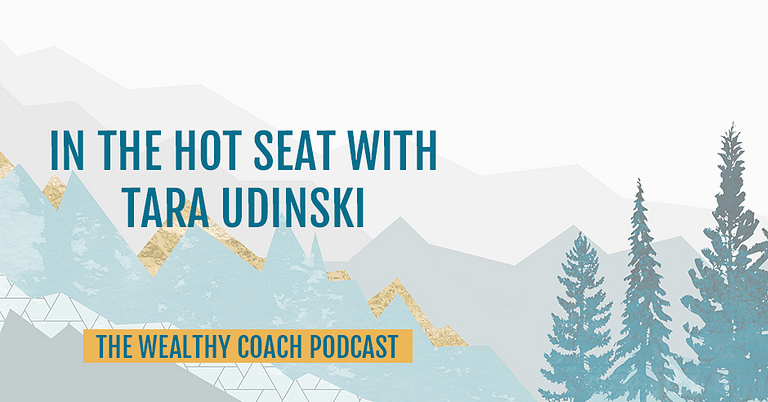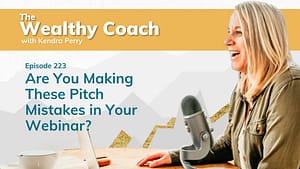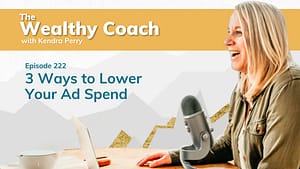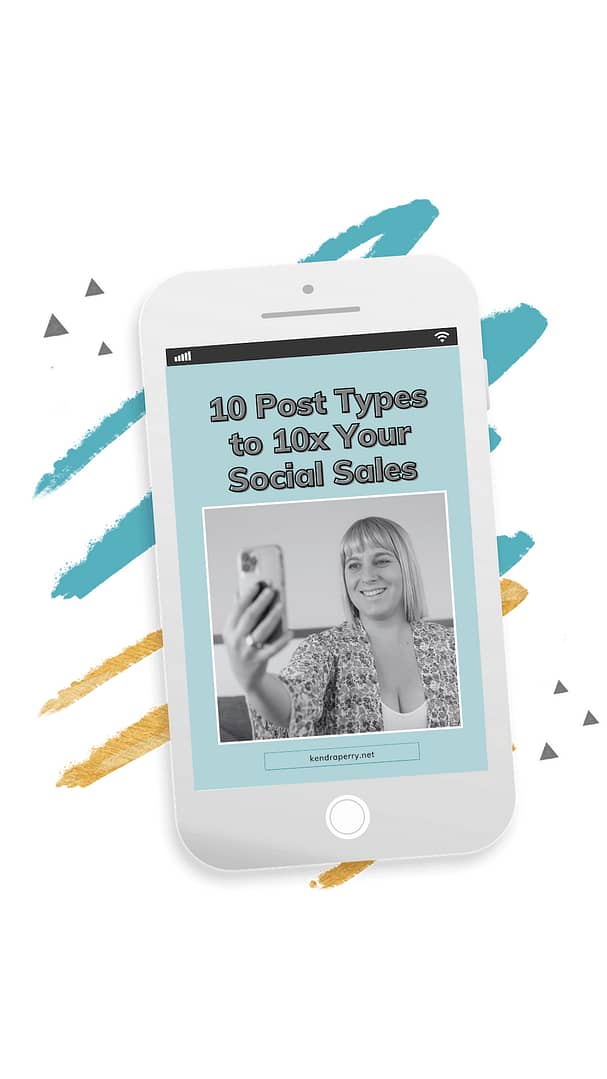If you’re struggling to get your business running, you may have a lot of questions…
How can I attract my ideal clients? How to prevent clients from ghosting me? When is it okay to pursue a group program? How to get more leads? How to get more clarity on my messaging?
Have these questions been spinning around in your head? You aren’t alone. That’s why I brought on a health coach, just like you, to coach them on these issues (and more) that you’re likely struggling with too.
In today’s episode of the Wealthy Coach Podcast, I’m putting Tara Udinski in the hot seat for a real-time coaching call. We discuss
Getting a niche whittled down
How to set up a group program
The key to creating a solid business foundation
The moves that need to happen to reach the goal of $5k a month
This episode has great energy and we made a TON of progress on Tara’s business.
Do you want similar coaching? I am going to be launching my program, the Health Coach Accelerator program, soon and want you to be a part of it! Get on the VIP list: https://go.kendraperry.net/hca
Connect with me on Instagram @kendraperryinc
—
Send in a voice message: https://anchor.fm/thewealthycoach/message
Support this podcast: https://anchor.fm/thewealthycoach/support
—
Listen to the podcast here:
In the Hot Seat With Tara Udinski
I have an episode that’s a little bit different that I think you’re going to find incredibly valuable. I know there’s so many of you out there who are struggling to get your business running in the way that you want. I know you have lots of questions. I thought it would be cool to bring on a health coach like you and coach them in real time on issues that you have too. We brought Tara onto the show. We are talking about getting her niche whittled down. We’re talking about her program, group programs. We’re helping her build that solid business foundation so that she can hit her goal of generating 5K per month. I hope you enjoyed this conversation with me and Tara. It was super fun. We had great energy. We made a ton of good progress inside this episode. I hope you enjoy my chat with Tara.
Before we dive into the episode, I have an exciting announcement. My brand new group program is opening up. If you’re a health coach or some wellness practitioner who isn’t generating 5K per month consistently, then this is exactly what this program is going to help you do. We’re going to kick things off live at the end of October 2020 until before Christmas of 2020. I am going to teach you the only things you need to implement in order to get to those sustainable 5K months. If we’re being real, there’s a lot of noise online. Your time is limited. We’re only going to focus on the things that matter, no extra, so that you can start enrolling new clients and getting dollars into your bank account as soon as possible.
Inside the program, we will identify your specific and profitable niche. We’re going to develop your unique brand identity so that you stand out online. We’re going to create your signature method, price it for profit and sell it like a boss. We’re also going to get your freebie set up and your email list set up so you can start generating leads and growing your following. If you want your business completely solid and ready to go for January 2021, which FYI is a huge month for health, then let’s do this. Get on my VIP list by going to. Doors are going to open October 13th, 2020. As one of my founding members, you are going to get bonuses and discounts not offered ever again. When I relaunched this program, it’s going to be significantly more expensive.
—
Tara, welcome to the show. Thank you so much for being here.
Thank you for having me.
I’m super excited. This is our first time on the show doing this hot seat coaching. I thought it would be super fun for all you reading to hear someone who has a lot of the same struggles as you and hear how I can hopefully help coach her through those issues. Tara, why don’t you tell us a little bit about your health business?
I am a FDN, Functional Diagnostic Nutrition Practitioner. I started my business years ago. It’s been quite the journey figuring out everything for it. I’ve only decided that I wanted to focus on gut health. FDN looks at everything, hormones, immune system. I’ve finally gotten a little bit of clarity on that. I’ve been dealing with a lot of common business struggles like clients ghosting, trying to figure out how to get ideal clients on sales calls, marketing, niching, everything, Instagram. I still have a lot to learn. I’ve made a lot of progress at least in 2019 and definitely could use a lot more feedback.
What would you say your big goal is for your business?
I would like to hit consistent income of about maybe 5K to 6K per month. I’m in the process of rebuilding out my program for the umpteenth time but I finally feel good about this version. I think it’s going to be able to last me that way I’ll be able to focus more on marketing and expanding out a little bit broader, maybe creating a mailing list or a Facebook group.
Thank you so much for that information. I’d liked to focus in on the issue with messaging and niching. Personally, I think you got to start there. If that’s not clear, everything else is hard for you and for the people who are following you. They don’t probably understand what you do or how you can help them. You said you want to focus in on gut health. Let’s talk about that. I looked at your social media. I looked at your Instagram. I have it open right in front of me. You say you help women with gut health, chronic digestive hormone and fatigue symptoms.
I need to update my bio. I’ve been resistant towards getting the right niche. I’ve had some coaches in the past try and help me but we never could get super clear. I know that I need to change it to get clearer on it.
What’s the resistance that you feel around niching?
I think with gut health, it’s related to everything like hormones and fatigue immune system. I want to be like, “Your hormones are related to. Your fatigue is related to.” I don’t know what the resistance is 100%. I think it’s maybe I’m not 100% sure who the person is but I know what they’re struggling with.
Let’s narrow in on this gut health thing. In order for someone to want to pay big money so that you can make a living off of, it needs to be a big pain point. It needs to be affecting them significantly. In terms of gut health, we need to get more specific with this. This might not be true, so tell me if I’m wrong on this. Do you feel if you get too specific, you’re going to be pigeonholing yourself and you won’t be able to talk about all these other things?
Yes, I think sometimes. There are a lot of topics around hormones that I do want to talk about and emphasize the importance of that. Maybe I do feel like if I do gut health only then I can’t talk about those isn’t true. I know that it’s not but I don’t know why.
Are hormones and gut health related?
Yes.
It’s always about bringing it back around. I totally relate to that. You’re like, “I’m going to get bored if I want to talk about all these other things.” As long as it relates back to your niche, you can talk about everything. You have to bring it back around and make it relevant. I want to talk about this gut health thing because it’s also broad. My question for you is do you think people are lying in bed at night being like, “My gut health?”
No.
Let’s try to narrow in around the big problem this person has. What is it about their gut that’s interfering with their life and lowering their quality of life?
Typical IBS symptoms, constipation, gas, bloating, maybe even diarrhea. Those are the big gut symptoms.
You said IBS. That’s specific. Would you agree?
I agree.
It’s the nice thing. I find with the pain points and niching, you want to either choose a symptom at least in health and wellness or a condition that people can identify with. I get why you wanted to do gut health because people don’t have one gut symptom. They’ve got a bunch of different gut symptoms. The reason is IBS because people know what it is and they relate to those symptoms. I think people lie awake at night worrying about IBS. They’re wondering like, “Am I ever going to poop again? Am I going to have diarrhea in the meeting?” This is great. How does that feel for you? How does focusing in on something like IBS feel?
That feels good. I think my only hesitation around IBS is because we’ve learned it’s not a real thing or condition. There are a lot of other real underlying issues like SIBO or an infection. I think that’s my only resistance to that. People don’t know that.

My question for you around IBS is, are people living in the conventional medical paradigm predominantly?
Yes.
Do you think most people are aware of the holistic aspect of IBS?
No.
Where do you think you need to meet them?
Halfway.
You need to meet them where they’re at. You need to go to them. You need to pull them. You need to meet people within the medical paradigm. I get this in health coaching because you’re like, “We learned that’s bullshit. That’s not how to help people.” We’re coming at it from this other way but people don’t know that yet because they’re not there yet. They’re like, “I got IBS. I think I have IBS. I seemed to have IBS symptoms.” A lot of people are self-diagnosing themselves. They don’t know it’s a bullshit catch-all condition that doesn’t mean anything. They’re never going to get anything but some drug to suppress symptoms from their doctor. They don’t know that. We have to go to them, meet them where they’re at and show them the new way.
You have to show them that’s a lot of great information to create content around. You’re like, “IBS, this is what it is.” This is why it’s a catch-all diagnosis when doctors don’t know what’s wrong with you. In fact, there are all these different reasons you could have IBS. That’s where you talk about parasites, SIBO, infections, hormones. That is a part of it but that’s not necessarily the niche. The niche is about using their language. This is great. We’ve figured out the problem. When it comes to niching, there are three points, the formula, there’s person, the who, the problem and the solution. We’ve got the problem. Let’s talk about the hoop. What type of person you help? You don’t want to be talking to every person on the planet.
Women are who I prefer to work with, although I’ve had male clients. Beyond women, I don’t know what else to go beyond that. They’re struggling with these chronic IBS symptoms. Maybe they’re in between the ages of 30 to 50. It gets in the way of work. It gets in the way of their social life.
Thirty to 50 is a good demographic. I don’t think you need to narrow it down. It can be 35 years old women who are obsessed with their career. You don’t need to go that specific. You can if that’s where it takes you but you want to differentiate. You would speak differently to an 18-year-old versus an 85-year-old, different life stages. Generally, like 30 to 50, it’s a similar life stage. I think that’s good. It’s okay to stick with women too and see who you naturally attract and then base it on the people who come to you too. You can get more specific later. Woman dealing with IBS is specific enough. We’ve got person problem. What’s the solution? What do you help them achieve?
This is what I’ve been struggling with a lot in putting into words. As you know, everyone’s not familiar with how FDN works. I feel like I help them A, get answers as to what is going on internally and causing their symptoms, B, I help them get clear on the right diet. I help them with corrective supplement protocols. Overall, the main idea is help them get a good understanding of how to improve their gut health, how to understand their gut health. I don’t know if that’s specific enough or clear enough for them to understand and find value in it.
We’re going to whittle this down. Let’s close our eyes for a second here. Let’s be your person, your woman in our 30s to 50s with IBS, lying in bed at night being like, “This is ruining my life.” Do they want answers? What do they want? What is their ultimate desire with that? What do you think they’re thinking in 1 word or 2 words?
They want relief and a solution for relief.
It’s about figuring out what word they’re using. They want the problem to go away. They don’t just want answers. Answers are great. Knowing why is helpful. Supplements are going to help them get that but they want the reversal. What will benefit you is to find 3 to 5 people to interview who are your ideal client. You’re not trying to sell them anything. You want to figure what words they’re using. You can do that in a conversation on Zoom or if you know someone in person. That’s incredibly valuable. If that’s hardly going, there’s tons of gut Facebook groups. Go in there. Look at the words people are using. We want to use their words.
I have people I can reach out to.
You might even say like, “I help them reverse these specific symptoms.” I want you to hone in how they feel when that’s gone. What is their gut feel like? Try to think of what having IBS is causing emotionally in their body, stress, embarrassment, discomfort, bloating, feeling fat and gross. That will help. Once you have those things, you can easily be like, “I’m Tara. I help women in their 30s struggling with IBS or symptoms of IBS get this.” It’s so clear. You’re saying it in one sentence. People shouldn’t have any follow-up questions. They should be like, “Cool.”
I think that would help a lot. I need to have a clear opening line like that in my bio because it’s not as you saw.
You’re trying to solve too many problems. As health coaches, we get it. It’s all connected but people don’t know that. You have to pull them from where they are and show them the new ways like your program. That’s your method. You have to pull the method away from the initial messaging. Your method is always going to change because we’re nerds. You’re always going to be researching new stuff, checking out, taking new courses, getting more training. Your method will evolve over time.
If that’s in the niche statement like, “I help women with IBS do this with gut healing, hormones,” then you’re going to be updating your bio when you learn new things and you get more experienced clinically. Your method can always be evolved but it needs one specific name. Behind the scenes of that can change. With your content and what you’re sharing, always bring it back to the gut, IBS and their experience. Why should they care about detox or hormones? How does that even relate to the gut? You’re going to show them how that does. Are there any questions about that?
No. I think that makes a lot of sense. I do have people, accounts and groups that I can go look for that messaging and their words to get exactly what they’re looking for.
Do you feel good about niching and messaging?
Yes, I do.
I want to talk about your program. You’re redoing your signature program. I know you also wanted to talk about group program. Why don’t you tell me a little bit more about your program? We can make sure that’s congruent with the new niche.
I think once I finally decided to focus in on gut health, that’s when I was like, “I need to redo my program.” I didn’t feel super confident about all of my sessions either. It was figuring that out as I go. I know you’ve talked about this. I was with every single client, every single session tailoring it to their needs, which was a lot of work. I’m like, “I can’t keep doing that.” I’m going to put a lot of work into creating a good framework with a lot of standardized sessions, tailoring turn areas for each client’s needs but I’m specifically focused on gut health.
That helped me get a lot of clarity. I feel good about what I’m building out. It’s taken me a lot of time. We get clear into diet, lifestyle, sleep, everything that’s connected to gut health. It’s about eight sessions. On the third session, I have a couple of diet sessions before we do the lab results. The diet is before the labs. Before I was just doing the labs and then the diet and it was too much at once for a lot of my clients, I think. Breaking it into a lot more manageable steps too so the clients are a little bit more compliant. It’s easier for them to follow.

How are you building this program out? Are you going to be teaching in session or are you having them go through some video module?
I am doing one-on-one clients. I’ll teach them in the session. I’m making a lot of standard presentations and handout so that when I am ready to do maybe an online course or group program, I have the content and materials to record on video if I need to.
You have your educational component. You have your coaching component where you’re going to coach them through their issues. What about accountability? How are you going to keep them accountable?
The check-ins, the sessions are part of the accountability. I used Boxer. I try and check in with them. Depending on where they are in the program, I’ll check in with them more or less often. I give them homework in the session so they have things to work on and review.
I considered the three pillars of a good robust coaching program, whether it’s group, whether it’s one-on-one, our education support accountability. That’s what people generally need to be successful. It sounds like you have that built in. How long is this program going to take? How are you making sure that they’re going to be completing that within the eleven timeframes?
I’m still figuring out a lot of the details of that. I’m building out my program as I go with my client that I signed. As he goes through it, I’m building up the sessions for him. My idea is about every two weeks for the initial two pre-diet sessions and then whenever we get to the lab results session. Every two weeks for few sessions after that and then maybe spread it out depending on how long the protocol is. Meet 3 or 4 weeks for the last two sessions and spread it out.
Is your plan to let people book as they go or are you going to book everything out in advance?
I book everything at each session when we book out the next one after that.
Is it going to vary a lot for each person in terms of program length?
That’s what I’m figuring out. I’m open to the idea of adding in more sessions. I think the way I was doing it before, I was like, “I don’t know what to talk about.” I had all these sessions and I wasn’t sure what to talk about and all of them. I have a lot of information and there’s definitely room to add more. I see how it goes as I get more clients and adjust as necessary. I’m still in the testing out phase. I don’t 100% know for sure.
I love that you’re testing it out to see how long should this actual program be. My recommendation would be to figure that out, have it be the same for everyone in terms of length and to book out all those appointments in advance when they sign up so that you know how many clients you can take on. Otherwise, it’s easy to over-schedule yourself and then go crazy. You’re like, “I have too much to do. I have too many clients.”
How would you recommend that with the lab testing since there’s a time lag and it’s not always the same amount of time?
You mean in terms of protocol? What would come up on a lab? Is that what you mean?
Scheduling out all the sessions in advance when you’re not sure when you’ll have the lab results ready.
This is a big struggle for functional coaches because they’re like, “This lab adds in this extra, puts a fork in things.” How you can do it? This is a way that I did it that worked well for me is I made sure. I was strict and clear around getting samples sent in. A lot of people procrastinate the shit out of that. It’s super frustrating. It’s important that within your contract, your client agreement that you were like, “I’m going to be sending you these kits.” I know when you get them because of tracking depending on what labs you’re using. Sometimes when the lab sends them out, they get there quick. If you send them out, send them expedited. Send them with tracking and put the cost of that. Bring it into your program price. Make sure that’s accounted for in your program price.
You know the general date that people are getting their tests. Give them a certain amount of time to get those samples sent in. You’re using something like practice better. You can set up a task for them to remind them. Depending on what you’re using, there’s a way to send that up. Even Gmail, you can schedule out emails. Say, “You need to do this because we have our test results scheduled on this date.” It might not happen until the middle of your program because you’re going to need that much time. You can do it in a way either where you have sessions before to fill the gap until you have test results, which is going to be about 5 to 6 weeks in total of sending kits, giving them a week or two to get them done and then waiting for results.
You can start the program on that six weeks from when you signed them date, which is what I used to do. I used to sign them, take their money, get their kits. I’d schedule out to test results sessions. It puts pressure on them because I’m like, “You have this session. If we don’t get results by then, you’re getting pushed back another six weeks.” You’re holding them accountable. You’re like, “This is what you signed up for. You got to get it done.” If you feel like it’s valuable to have sessions leading up, which you can do too. You could have a couple of sessions before you go through the test results and then with lab results. I don’t know if you’re doing something like GI-MAP for example but sometimes the thing is lit up with everything. You’re like, “There’s six months of protocols on this.” That’s fine but they’re still getting their 3-month or 4-month program.
At the end of that, they can either do it on their own, which is fine, or you have the next step, next level program, recurring support where they get one session per month and they pay a monthly fee. There are few different ways you can set that up. You could have a couple of different levels of support. Maybe they get Boxer access to you because maybe that’s all they need but maybe they get an appointment every month. Honestly, it’s a logistical nightmare to try to figure that out. It took me a long time to be like, “How do I make this work so that everyone’s program isn’t a different length?”
That has been a struggle. I’m like, “How do I space these out?” I liked that idea.
It holds accountability on the person. I know if they don’t have pressure, you’re like, “Have you sent in your lab tests?” That doesn’t work because you’re a business owner. You can’t organize a business around flaky people.
I think having the 3 or 4-month program and then the sessions aren’t too spread out, which I had done before. Part of that was like, “Why some of my clients had fallen off?” We weren’t meeting often.
That’s a good segue unless you have other questions about the ghosting issue.
We can talk about it. I feel better that I’ve gotten clearer on my program. I think a lot of it was I wasn’t super confident. I don’t know what to do at every session. Subconsciously, I didn’t want to meet with them. I think it might still be worth talking about a little bit.
Why don’t you tell me a little bit about the issue you were having and then we’ll dive into that?
I had one client. I’m not taking it super personally because it’s from day one. She was canceling last minute every single session. I don’t know. She wasn’t my ideal client. I know what the issue was going on there but she fell off halfway through. I’ve had a couple of clients who signed on. We maybe had one introductory diet session and then I never heard from them again or they never sent their lab test in. I don’t know what the issue was there either. I had another client at the beginning when I first started who dropped off. I think a lot of it was I wasn’t sure what I was doing at the time.
What I want to tell you is that it’s not always about you. It’s usually about them. There are things we can do to find better people but sometimes people do that. I’ve had people sign up for a $5,000 program and ghost me. I was like, “Did they die? Are they dead?” I looked at their social media. I’m like, “I hope they didn’t die.” They’re not dead. They just weren’t ready. Sometimes it can have to do with your whole enrollment process and making sure that you’re choosing the right people. Sometimes it also has to do with price point. The lower you price, the least committed the person is or the least ready they are. It’s not always the case. With your higher ticket, they’re easy. They do the work and they don’t email you that much.

My pricing is on the lower end. I think I wasn’t confident at the time charging more. That could have been a part of it too.
Let’s talk about your enrollment process. It sounds like you get people into a sales call.
I haven’t been actively doing a ton of sales calls because I’ve been super focused on building up my program. I’ll get people onto a sales call. I have a few different scripts that I’ve had different coaches. I got your sales class. That’s the one I’ve been using. I used it for my client. I go through that as it is.
It sounds like you’re positioning the call.
What do you mean by positioning?
Remember in that workshop, I talked about not calling it a free consult. It’s not a coaching session. In the way that you’re marketing, you’re like, “This is a qualifying call. This is an enrollment call. We’re talking about if you’re a fit. This isn’t a call for free information.”
I try to be conscious of that. I haven’t been actively asking for calls. I can’t say exactly how my messaging has been. I do have an application in my bio. I’m not sure if that’s the best method. I got it from another sales coach. When I’m messaging them, I do say it’s a clarity call to get clear on what their goals are. I do that. Once I sign them on, they pay on the call and then I will send them the program agreement right after that. Once I get that, I’ll order the lab tests, send them a welcome email with all the information they need, all the details. I’ll set them up with a Trello board, have all their documents there. I’ll send them a welcome gift as well.
I want to go back to what you said about not feeling confident asking for sales calls. Can you tell me more about that?
I’m still not 100% sure. I have a DM script from another coach that I use. I don’t know how to reach out to people. I have a handful of people who follow me religiously. They like all my posts. They watch all my stories but I’ve never had any conversation with them. I don’t know how to start a conversation. I’ve had people who have reached out to me saying like, “I want to learn more. Can you tell me your prices?” I know you’re not supposed to tell them your prices over messaging so I’ll say, “Here’s how I work. If you want to set up a call to get clear, here’s the link to schedule.” I don’t hear from them again. I don’t know if I’m doing something wrong there. It’s been slow. I don’t know if it’s because it hasn’t been a priority for me to get a lot of calls or if I’m doing something wrong. I’m not sure.
I noticed an opportunity there. You say that there are people who follow you religiously. They like all your stuff. They follow your stories. There is a lot of value to be had from direct outreach. I still do this in my business with Instagram. It’s not the type of outreach, which is like, “I’m Tara. Buy my program.” That’s super gross, annoying and inauthentic. I would reach out and acknowledge that they’ve been following you for a while and say hi. I think there are a lot of values striking up conversation. I’m checking in with them. Be like, “I noticed you’ve been following me for a while. We’d never talked. I wanted to reach out and say hi.”
This is something I do with new followers for the most part. I try to welcome all new followers. What I do is I go to their Instagram account. I look for a sweet picture, something that we have in common or something I can ask them a question about and I screenshot it. I’m like, “You have the same Arc’teryx jacket as me. That’s cool. Where was your most recent trip?” I like to start conversations because that is helpful. A lot of them don’t go anywhere and that’s fine. It’s about building relationships and getting on people’s radars.
I think it’s like I never know what to say. I feel like when conversations do drop off like I do, I’m like, “What did I do wrong? I did something wrong in it.” People are not always up. People are busy. I don’t always respond to every single message either.
People have the attention spans of goldfish. I do too. I’m not judging people. Sometimes it does die off. Sometimes there’s not a natural transition to ask but you can go back and forth. If it feels good being like, “I noticed that you’re following me for IBS. Is that something you’re struggling with, if you don’t mind me asking?” Ask and see if you can help. If it feels natural, then invite them onto the call. If they don’t respond, I follow up once. I check in with them. If I get nothing, I’m like, “They’re not ready.” I agree with you to not post your price because then that’s all people have to compare you to with other people. What you offer is valuable. It’s invaluable. People change their health, they change their lives. I think that’s great to say, “It depends on where you’re at but let’s hop on a call and see if working together feels like a fit like no pressure.”
With sales calls, it’s a numbers thing. It’s the more, the better. I would advise against the application until you have too many sales calls. It’s good to get the experience. You want to do them over and over until you feel good about them. You get your close rate to that at least 25%. That can get higher. I’ve had close rates of 80% when I was super direct with my messaging and the people I was attracting were all aligned. I had a high close rate. If you can get to 25%, that’s a good starting point. Sales calls are super annoying. They’re also energy draining but they are the best way to get a client. If you can master them, then you’ll have no problems in your business.
As soon as I build out my program halfway through, I feel like I’ll be ready to start getting out there more asking for sales calls because it has been slow for me but I haven’t been putting myself out there asking for it as much.
You’ll notice a shift in confidence with having a clear message with who you help. Helps you feel less scattered and you’re like, “I know what I’m here to do.” Your next question was around group programs. What are you thinking about group programs? What do you want to ask me about that?
I would love to have a group program. I’ve done lots of group programs myself. I participated in them. I love having a community and a group of people to help support you. I think my biggest struggle with my work, especially as an FDN is how do you translate lab work? Maybe I create a program without lab work into a group program.
It comes down to what that customer journey looks like and what you want your business structure to look like. You can do this a couple of ways. You can use your private coaching program to drive into something like a group program or you can flip it. You can have your group programs or drive into your private coaching program. You always want something for someone to go once they’re done one thing if they want more from you. The lab does add. It puts a fork in the whole easy, simple structure of a group program. You can do it. You need to create strict rules around when they’re submitting their tests. If you are adding labs into a group program, it could be still a strict group program where you do a Zoom group coaching call, people ask questions and they get a written protocol. You can do it that way. It might be more of a hybrid as well or maybe they do get a one-on-one.
With a group program structure like that, you have to be charging properly for it. You can’t scale it. It has a max because your time is involved. What might work for you is to launch a program and have the start date be 30 days out. People will buy for something that’s 30 days away. They buy. You send their kits. The program starts once they send in their samples. You can do it that way. I would say for group program, you’re wondering when is a good time. I would say the best time to start a group program is when you can find five targeted people for that program. That’s all you need to test. To run a first program, you need 5 to 10. You can get that, then that’s enough people to do a group program. You don’t need a big following for that. Potentially, you have those people in your audience.
I have potential clients but I have to learn how to reach out to them and get the client chasing the group.
It sounds like you’re already creating the structure for a group program inside your private coaching program. Everything you’re teaching. I wouldn’t want you to create a whole another program. I would want you to take that private coaching program and turn it into a group format. You’re not reinventing the real. You’re using the stuff you already have. You’re teaching it in a bit of a different way. A great format for group program is to have your education training session and then have your group coaching call a week however you’re going to set that up. You have the coaching call. You teach coaching call and run it in that format. It sounds like you’re already creating the content for that. It’d be simple to do it.
That’s what I had in mind as I’m building this out. Can I convert this at some point to convert to a group program?
With the first group program, you don’t need anything fancy. You just need outreach. You need to think of, “Who of my audience would be interested?” Send them a message like, “I’m thinking of doing this group program. I’m looking for test clients or beta clients to come through it. Are you interested?” If you can get five yeses, then you can go for it. Keep it simple. Don’t complicate it. You don’t need fancy sales page, funnel or webinar. You’re looking. The test people are going to get a cheaper price point. Make sure to put things in place to get lots of feedback so that you can make the program better.
Hopefully, I’m on track for that too. I feel building the foundation.
I’m excited. I think that program can be a lot of different things. Potentially, you could even repurpose it one day into a DIY course at a lower price point for people who don’t want to pay for the coaching and stuff.
That was what I had in mind too, group and hopefully, online as well.

Do you have any other questions for me?
I think we covered my main questions. A lot of it was how to reach out to people again. Building out my program is my main priority. What do you recommend once I’m sentenced down with that and I’m able to mark it a little bit more? I know you’ve talked about mailing lists, which I don’t have, a Facebook group or something to get people in a little bit more, real than in a little bit more. What do you recommend as a next step after that?
One hundred percent focused on an email list. That is your most valuable tool as an online business owner. You own it and you have control over it. Social media, it’s always changing. Algorithms are always changing. Especially in 2020, when there’s a lot of censorship going on for health and wellness. You want to get people off social media as much as possible onto a list so that you know that you’re reaching them.
That’s what I thought too. That’s what I was thinking. Hopefully, by the New Year of 2021, I’ll be ready to go hard on creating a mailing list, some freebies and things like that.
You have your niche. You want to think about what’s an amazing bomb ass resource that you can create for people, women with IBS that’s going to help them that they’re going to want to give away their email address to get. Pull it from your program. Don’t reinvent the wheel. Take it straight from your program, whether it’s a PDF, a checklist, cheat sheet, some workbook or something like that. Anything else you wanted to ask me about?
I think that we covered everything that was on my mind. Thank you so much.
You’re welcome. I hope you found that helpful. That was super fun to do. Thank you for hanging out with me.
It’s so valuable. Thanks for having me. It’s great.
Thanks everyone for reading the show. As always, I’m here to help you become wealthy AF. I will see you next time with the next episode. I hope you have a fantastic week. Thank you so much for tuning in. I’m wondering, do you want to help me with my mission to end health coach poverty? If you do, I need all the help I can get. All I need is two minutes of your time. If you could leave me a five-star review on, that would help so much. These reviews help get my show in front of more people, which means that I can reach more health coaches and complete my mission. Thank you so much for your help. I can’t wait to talk to you in the next episode.
